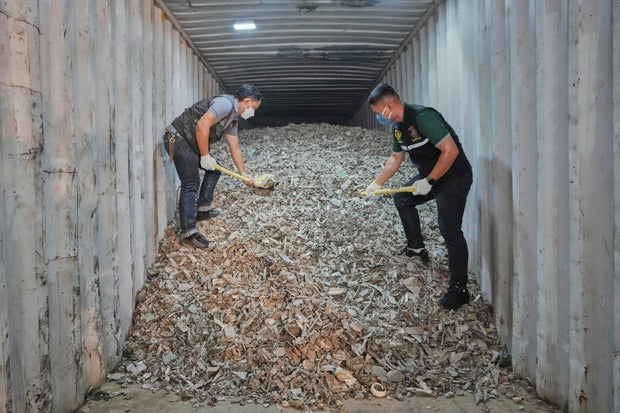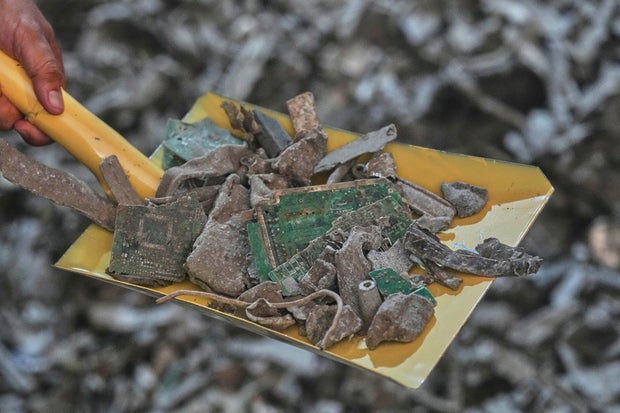E-waste growing at record levels: U.N. report
Thai officials on Wednesday said they seized 238 tons of illegally imported electronic waste from the United States at the port of Bangkok, one of the biggest lots they've found this year.
The waste, which came in 10 large containers, was declared as mixed metal scrap containing aluminium, copper and iron, but turned out to be circuit boards mixed in a huge pile of metal scrap, said Theeraj Athanavanich, director-general of the Customs Department.
The electronic waste — which is classified as hazardous waste under the Basel Convention on the Control of Transboundary Movements of Hazardous Wastes and Their Disposal — was found on Tuesday after the 40-foot containers became the subject of a routine random inspection, officials said.
The Basel Convention is an international treaty signed in 1989 meant to deal with hazardous waste flowing into developing countries as costs for disposal grew along with the amount of waste.
A U.N. report last year said electronic waste is piling up worldwide. Some 62 million tons of electronic waste was generated in 2022 and that figure is on track to reach 82 million tons by 2030, the report said. It said only 22% of the waste was properly collected and recycled in 2022 and that quantity is expected to fall to 20% by the end of the decade due to higher consumption, limited repair options, shorter product life cycles, and inadequate management infrastructure.
 Thai officials show samples of illegally imported electronic waste from the United States which they said they seized at Bangkok Port during a press conference in Bangkok, Thailand, Wednesday, May 14, 2025.
Sakchai Lalit / AP
Thai officials show samples of illegally imported electronic waste from the United States which they said they seized at Bangkok Port during a press conference in Bangkok, Thailand, Wednesday, May 14, 2025.
Sakchai Lalit / AP
Theeraj said Thai authorities are looking to press charges including falsely declaring imported goods, illegally importing electronic waste and planning to re-export the waste back to its country of origin.
"It's important that we take action on this kind of goods," he said. "There are environmental impacts that are dangerous to the people, especially communities around factories that might import these things for processing, then recycling."
Electronic waste creates huge health hazards. Many components are laden with lead and mercury, cadmium and other toxins. Recyclers are after gold, silver, palladium and copper, mainly from printed circuit boards, but lax controls mean that facilities often burn plastics to release encased copper and use unsafe methods to extract precious metals.
 A Thai official shows samples of illegally imported electronic waste from the United States which they said they seized at Bangkok Port during a press conference in Bangkok, Thailand, Wednesday, May 14, 2025.
Sakchai Lalit / AP
A Thai official shows samples of illegally imported electronic waste from the United States which they said they seized at Bangkok Port during a press conference in Bangkok, Thailand, Wednesday, May 14, 2025.
Sakchai Lalit / AP
Thailand passed a ban on the import of a range of electronic waste products in 2020. The Cabinet in February approved an expanded list of the banned waste.
Sunthron Kewsawang, deputy director-general of the Department of Industrial Works, said officials suspected at least two factories in Samut Sakhon province, which borders Bangkok, are involved in importing the waste. Last year, Thai officials found thousands of tons of smuggled cadmium waste at a factory in the province, Thai PBS reported.
Residents near the area were later found to have usually high levels of the poisonous metal in their urine, according to the report. Exposure to cadmium can cause flu-like symptoms, including chills, fever and muscle pain, according to the U.S. Occupational Safety and Health Administration. Long-term exposure can lead to cancer, kidney, bone and lung disease.
In January, the Customs Department said it seized 256 tons of illegally imported electronic waste from Japan and Hong Kong at a port in eastern Thailand.
- In:
- Hazardous Waste
Kiki Intarasuwan contributed to this report.











 English (US) ·
English (US) ·